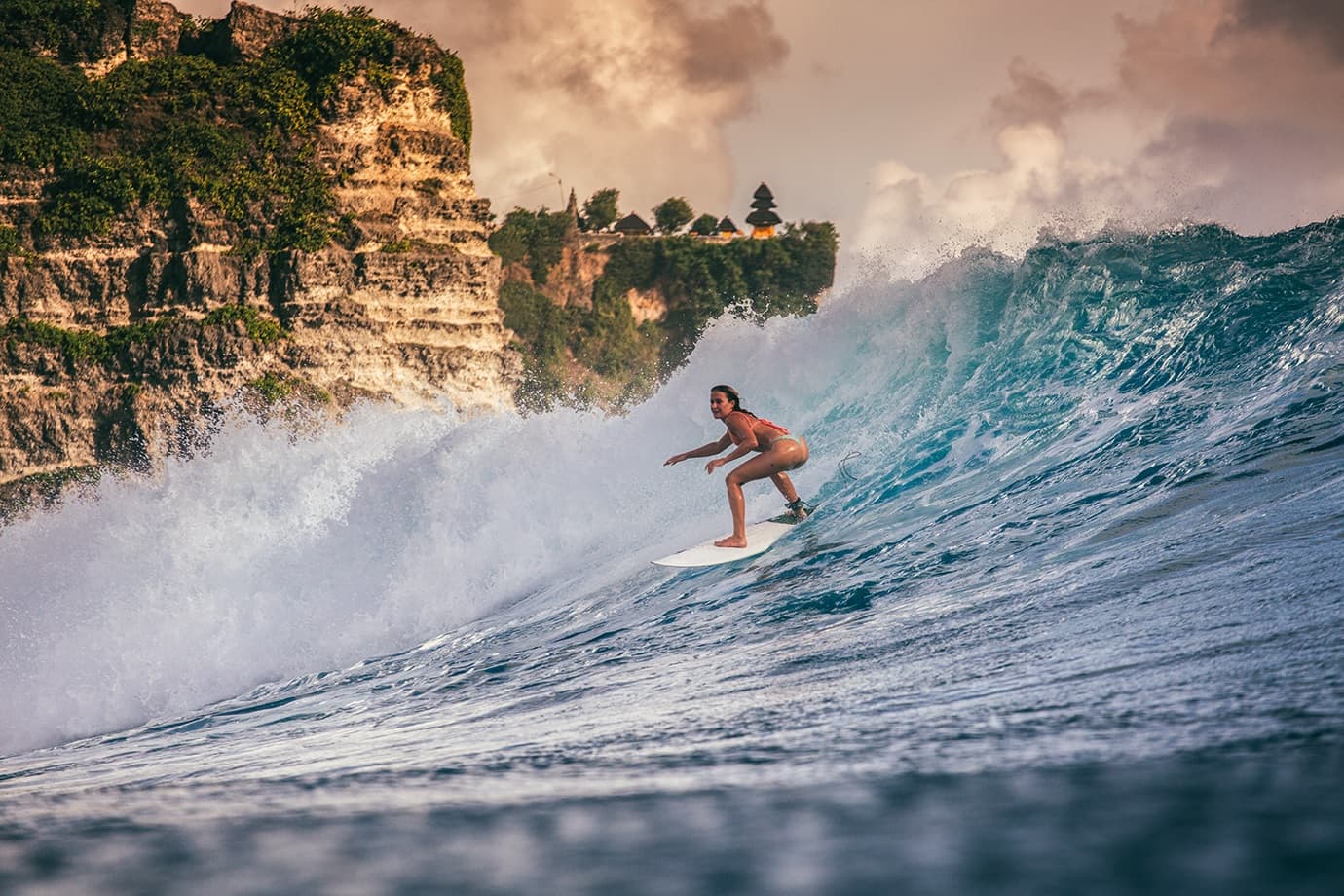If you’re going to spend time in Bali and it’s your first time on the island, you may be wondering if Uluwatu is safe before you commit to spending your holiday in this part of the Bukit Peninsula.
Well, there’s no doubt that yes, Uluwatu is a safe place and that with just a few minor precautions combined with a healthy dose of common sense, you can enjoy a trouble-free break in Uluwatu.
So, to assist with that, we’ve come up with this guide including safety tips that will ensure you have an amazing holiday in Uluwatu and stay safe throughout your time here.
Crime In Uluwatu
Bali’s provincial government doesn’t release individual crime figures by area, so it’s impossible to comment directly on Uluwatu in this respect. However, if we ask the question, “Is Bali Safe?” in this context, we can say “yes” with a high level of confidence.
The police in Uluwatu say that it has a relatively low level of crimes even when compared to other parts of Bali, so you should, in theory, be able to avoid becoming a victim of most crime by taking simple precautions.
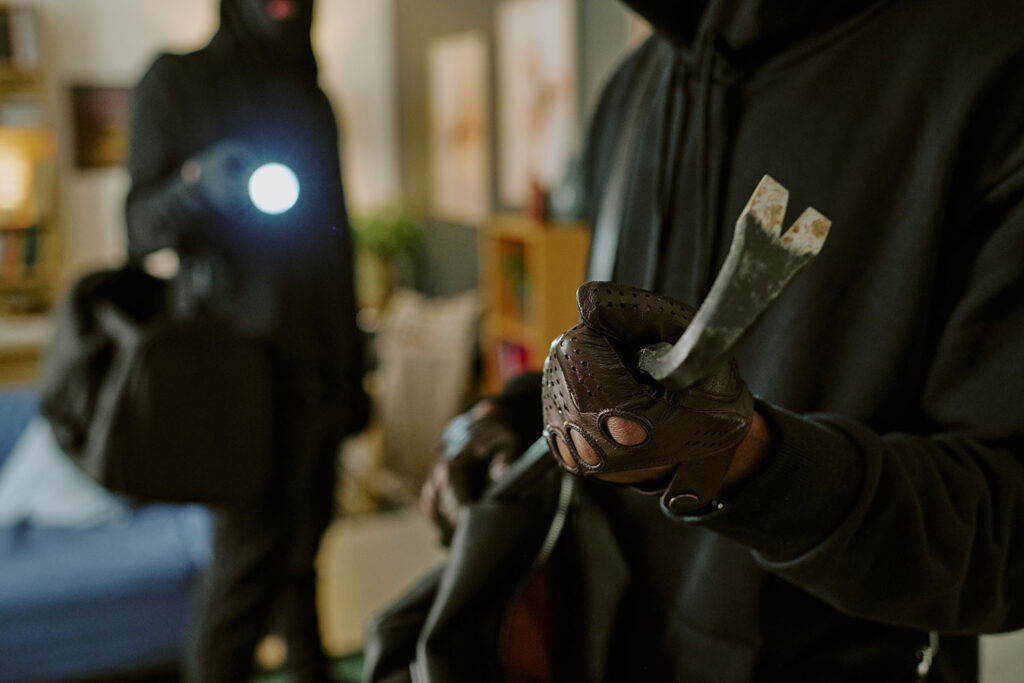
Burglary And Robbery – They’re Rare But Villa Break-Ins Do Happen
Burglary isn’t a common crime in Bali, but if you opt to stay in a villa you should be prepared to take security precautions to protect yourself and your family.
This is particularly true because a burglary can suddenly become an armed robbery if you find yourself in the villa at the time.
So, make sure that all the doors and windows are closed at all times when you’re not in the room and if you have locks, make sure to lock them – particularly before you go to bed or leave the villa for a period of time.
If there’s an alarm system available, we’d strongly recommend that you use it. In some incidents, thieves have actually waited inside a villa for the residents to return from a night out to remove their last possessions. It’s best not to make this easy.
Illegal Villa Rentals – A Growing Problem
One good reason to opt for a hotel or resort complex rather than an individual villa is that there is a growing issue with illegal villa rentals in Bali.
In order for a property owner to rent to a tourist legally, they must be registered with the authorities and in the case of villa owners, they are meant to be locals rather than foreigners.
It’s impossible to verify on Airbnb or Booking.com that this has taken place and if it hasn’t and the authorities decide to pay you a visit, you can be evicted from the property immediately and you will lose any deposit or fees that you’ve paid.
When you book with a resort or complex, these places are simply too large not to have registered properly and you’re at no risk of eviction, etc.
So, when Little Bingin opens, you can enjoy a blissful night’s sleep without worrying about this kind of problem.
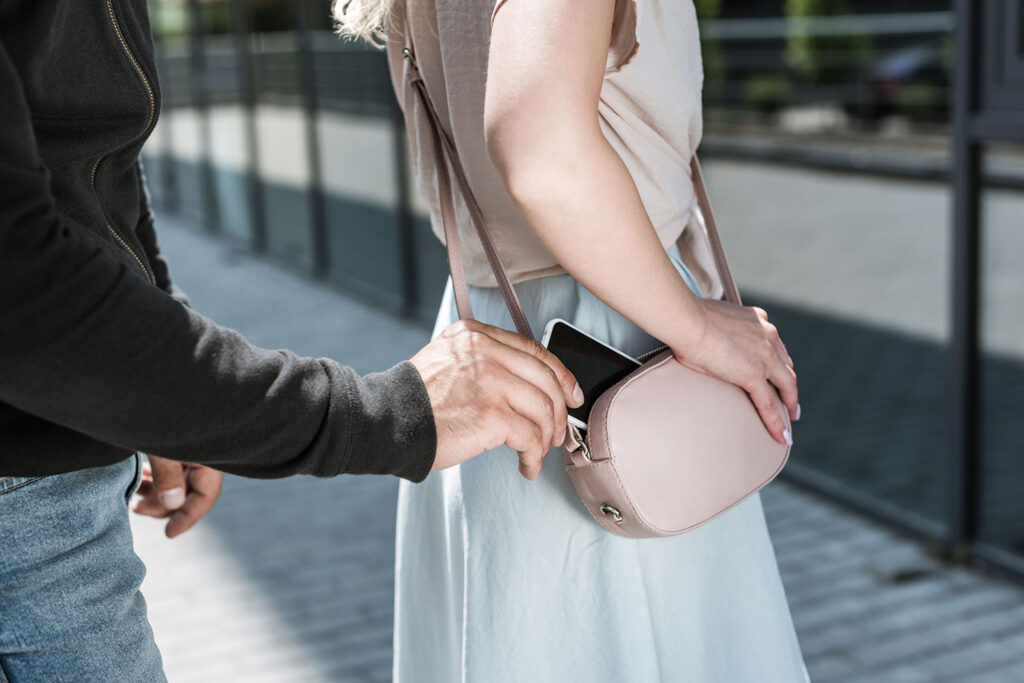
Pickpocket Can Be An Issue At Busy Tourist Sites
Petty crime is, without a doubt, the biggest issue you’re likely to face here in Bali and pickpocketing is the worst of these crimes.
You can substantially reduce the risks of pickpockets and bag snatchers, however, by:
- Appreciating that pickpockets are always around. If there’s an area where tourists are spending money, it’s extremely likely that there are pickpockets present. Yes, this means in open air markets, banks, supermarkets, currency exchanges, etc. as well as big tourist sites. If it’s busy, it makes pickpocketing much easier.
- You need to keep an eye on your surroundings. Many pickpockets will trigger a distraction to draw your attention before they pounce. Little children (particularly in groups) are often used for this purpose.
- You want to ensure you keep your wallet or purse as safely as you can. Wrap an elastic band around your wallet and keep it in a front pocket. That way, if someone reaches in to steal it, it will drag against the fabric and alert you. Never put your wallet in a backpack, back pocket, jacket pocket, etc. these are really easy places to take a wallet from.
- If you really have to keep a wallet in a bag, make sure it’s secure. An internal zip-up pocket is a much better idea than one on the outside of your bag.
- Try to carry a single card and small amounts of cash at any one time. Stick everything else inside the hotel safe or hidden at the bottom of your bags in your accommodation.
- Patting at your pockets to check for your wallet helps pickpockets. You’re signalling where your wallet is.
- Leave expensive flashy stuff at home. Ideally, don’t bring it to Bali but if you do, expensive sunglasses, designer wallets, gold jewellery, and brand name watches are all very appealing to thieves – leave them in your room.
- Don’t carry more than you need – the more stuff you have on you, the harder it is to keep track of that stuff. That makes a pickpocket’s job easier.
Drink Spiking Is Always A Possibility
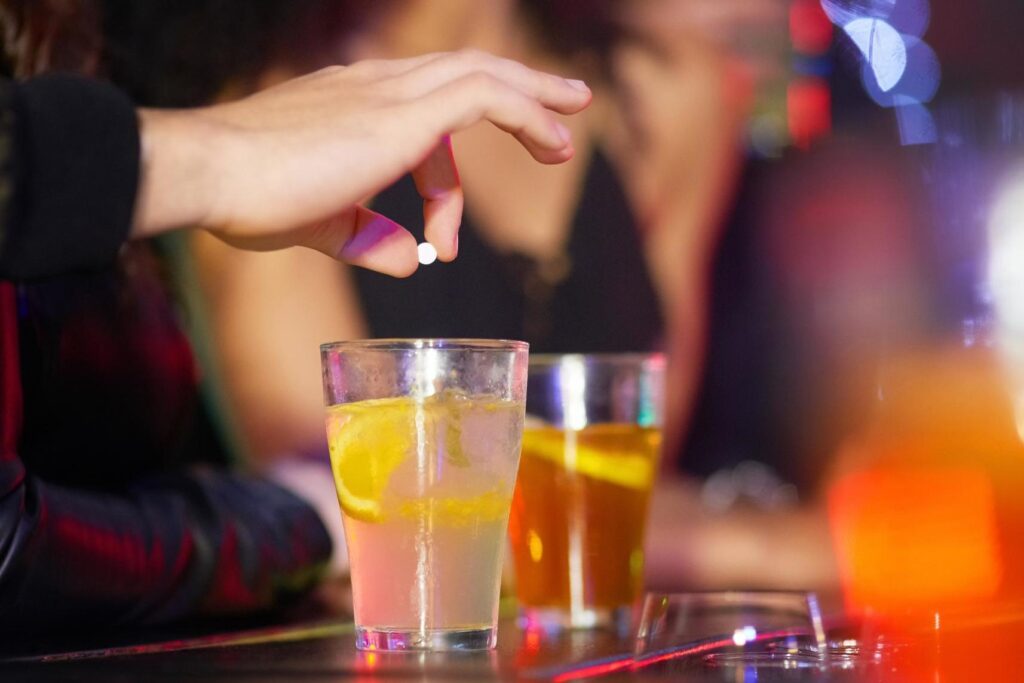
Drink spiking is nowhere near as common as the media would like you to believe. In fact, research suggests that mainly “drink spiking” is holiday over indulgence combined with tropical heat which makes alcohol have a stronger effect.
However, drink spiking is not impossible, and it only takes common sense to avoid any risk. Simply, never leave your drinks unattended. Yes, if you have to, take your drink to the toilet with you.
Sexual Crimes And Crimes Involving Violence Are Extremely Rare
Solo female travellers will be happy to hear that sexual assault is very rare in both Bali as a whole and in Uluwatu.
And both men and women will be relieved to know that violent crime is almost non-existent. What little does occur tends to be alcohol related near pubs and nightclubs, particularly at closing time.
Some Possible Scams In Uluwatu
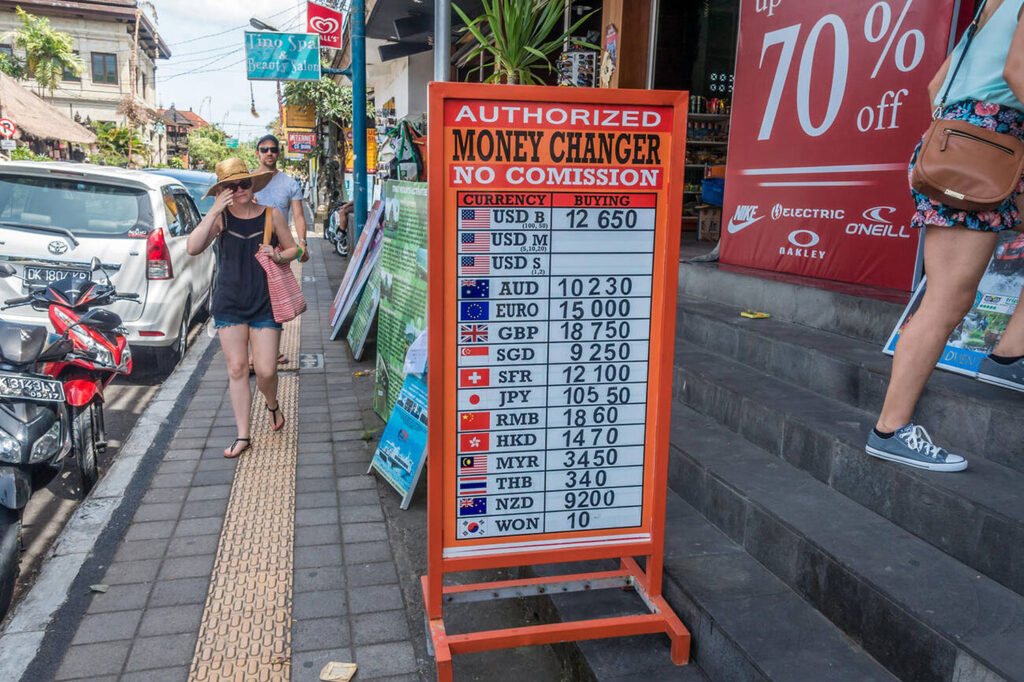
While Uluwatu is, generally, safe, where there are tourists in this world, there are usually a few scammers around hoping to take advantage of their trusting nature.
You can avoid most scams simply by thinking things through and if something seems “too good to be true”, then, it often is.
Look out for:
- Free scratch and win lottery tickets. Technically, these aren’t scams, they’re legitimate incentives to attend very long, very high-pressure sales presentations for timeshare properties. Many of the prizes are contingent upon actually making a purchase too.
- Money changers. Only use an official money changer (they all have roughly the same rates). Unofficial changers offer low rates because they skim the cash and you will walk out with much less than you would have got at a proper money change.
- Watch out for fake taxis. Bluebird is Bali’s only truly reputable taxi company. Sadly, the scammers know this and have started to make fake Bluebird cabs. It’s probably better to use a ride-share app than take a chance.
- Ignore any demands for money. We need to stress that we mean “ignore”, don’t get into any kind of argument or heated debate, it could turn ugly. Whether they are monks or guides, just walk past without acknowledging them.
- Don’t gamble. We can’t be any clearer than this, gambling is completely illegal here in Indonesia. Not only will you be fleeced while you play, but then you are likely to be arrested once you’ve been rinsed and have to pay bribes to avoid jail.
- Don’t fall for visa agency nonsense. There’s a going rate for nearly every service in Bali, if you find somebody hugely undercutting the market, it’s almost always because it’s a scam.
- Avoid public ATMs. If an ATM isn’t inside a bank, mall or supermarket. Don’t use it. Card skimming is a serious problem. However, the introduction of Chip and PIN technology here does mean they won’t clone your card in stores any more.
- Do your homework before donating to charity. Some charities here do a lot of good, others are a complete con. Before you hand over millions of IDR, it’s best to work out which is which.
Why You Don’t Want To Get Involved With Drugs In Uluwatu
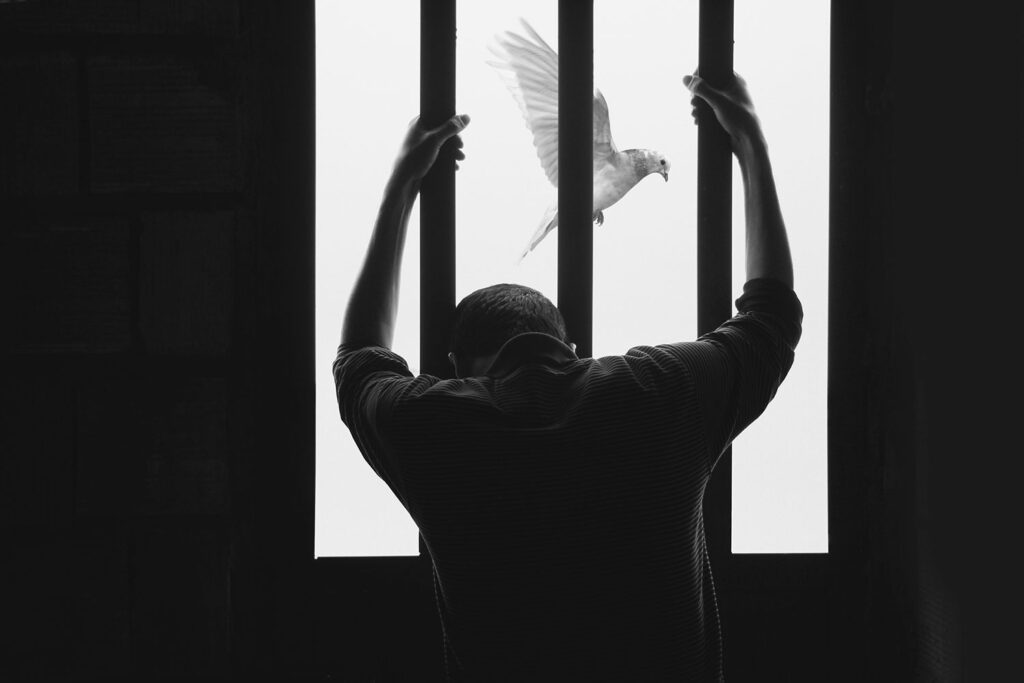
One time that Uluwatu will not be safe is when you decide to get involved with the drug scene in Bali.
We cannot stress enough that the Indonesian government, the Balinese government, the Indonesian media and the general public themselves are all extremely anti-drugs.
People can and do spend years in a cell in Indonesia for simple possession and while there appears to be a moratorium on the use of the death penalty in drug cases, for now, that means you might spend your entire life in an Indonesian prison, instead, a fate many would argue is worse than death.
A change in regime might also see a return to the days when Indonesian authorities regularly executed foreigners for drug crimes.
You should also be aware of the fact that your embassy cannot interfere or assist in any way (except for referring you to local legal representation) if you are charged with drug-related crimes.
Please, for your own sake, if you want to spend your holiday doing drugs, go somewhere with less serious drug laws. You really don’t want to have to face the consequences of ignoring this advice in Bali.
Staying Safe While Travelling Around Uluwatu
How safe are the different modes of transport in Uluwatu?
Walking?
You can walk in Bali, but you may not want to. There are a few challenges in Uluwatu when walking:
- Uluwatu is a very spread out area – that means you may need to walk very long distances between places
- There are no real sidewalks in much of the area – that means walking in the road where the Bali traffic may not even notice you
- The walking surfaces are in poor condition – you will need to keep your wits about you while walking
We would also advise taking precautions against sunstroke and heat stroke if you want to walk in this area.
However, you can walk in Uluwatu, it’s just challenging. But those with mobility issues will find it very hard going. The area is also not suited to wheelchair travel.
Taking A Bus?
Bali has almost no public transport and you’re not likely to find a bus in Uluwatu. The majority of visitors will opt for ride-sharing as it’s relatively cheap and very convenient.
Taxis And Ride-Sharing
Grab and Gojek are the two main ride sharing apps in Bali (Grab is part owned by Uber) and you can get a safe, clean ride easily with these services.
As Uluwatu is quite spaced out, you may need to wait a little longer for your ride to turn up then in some of the other more developed towns on the island. So, factor that in when planning your trips around the area.

Scooter Rental
We never recommend renting a scooter in Bali. It’s hard to be road legal – you need a driving license from your own country with a motorbike endorsement (a car license won’t cut it), a current international driver’s permit and a safety helmet.
If you don’t have these three things, you cannot be insured in Bali even if you have purchased insurance, it won’t pay out.
And given that the roads are in poor condition and local driving standards are not great, accidents do happen in Bali all the time. It’s better to use ride-sharing, they have scooter drivers as well as car drivers.
Is Uluwatu Prone To Natural Disasters?
Uluwatu is very unlikely to be directly impacted by any natural disasters. The volcanoes on the island are on the opposite side of Bali, an eruption might delay your flights but it won’t see Uluwatu drowned in lava.
There are minor earthquakes in Bali, but they tend to be extremely minor and pose no real risk to travellers.
This end of Bali is also very unlikely to be impacted by tsunamis. So, the only real risk might be flooding during the rainy season which is more likely to be inconvenient than dangerous.
Is Terrorism A Problem In Uluwatu?
While nowhere is guaranteed to be terrorism free, there’s never been a terrorist incident in Uluwatu and there hasn’t been a terrorist attack in Bali of any kind since 2002, and that was in Kuta, not Uluwatu.
We’d still recommend that you take sensible precautions while out in public, just in case, but we wouldn’t waste any real time worrying about terrorism in Bali.
Can I Play With Street Dogs In Uluwatu?
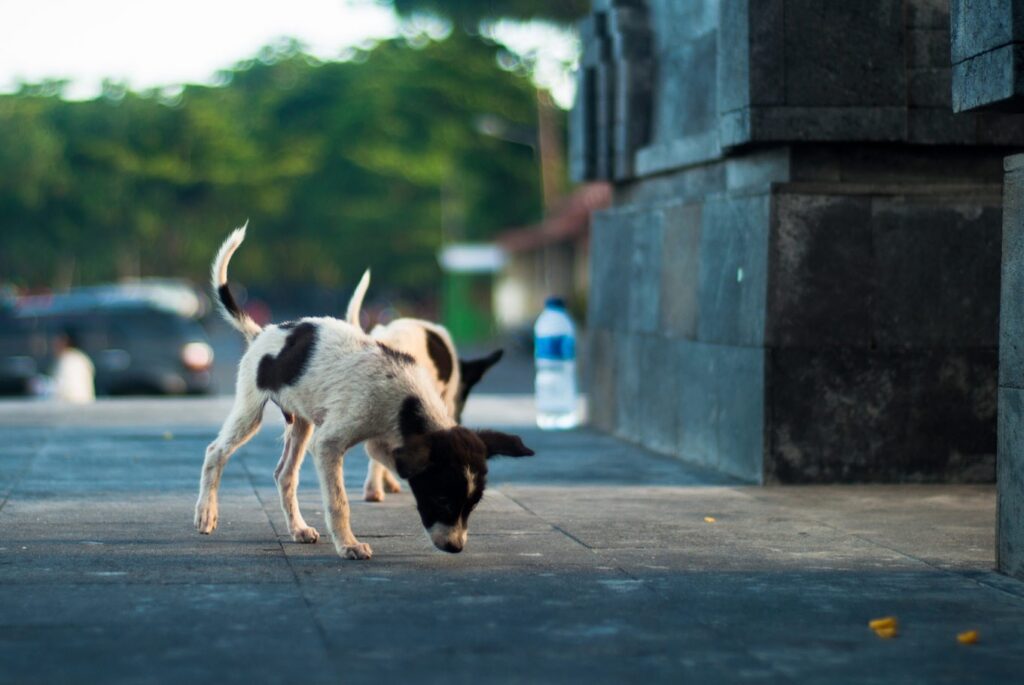
Bali’s stray dog population may be cute, but they’re not really pets in the common sense of the word and petting them is not a good idea.
Rabies is a real and present danger here in Bali and if you get bitten by a dog, then you will need to arrange a vaccination here on the island.
If you’ve already been vaccinated against rabies, you have 48 hours to find a clinic with the vaccine and serum, if not, you have 24 hours.
It is very important that you know that if you do not get vaccinated and you do contract rabies, the fatality rate is 100%. Once rabies symptoms start to show the disease is universally fatal.
Sadly, the vaccine is not free here in Bali. It can cost over $2,000 AUD ($1,500 USD) for a full course of treatment! This is one of the reasons that travel insurance can often be a good idea.
We would also stress that finding clinics with the vaccine in stock can be a real challenge here, so we’d recommend avoiding the street dogs, even if they are super adorable.
What About The Monkeys At Uluwatu Temple?
Monkeys can carry rabies. They are also wild animals and can be extremely violent and when they are, they tend to gang up on you.
You are strongly advised to stay away from monkeys and even if they steal something from you, you should approach a local guide to help, never the monkey.
Potential Health Risks In Uluwatu
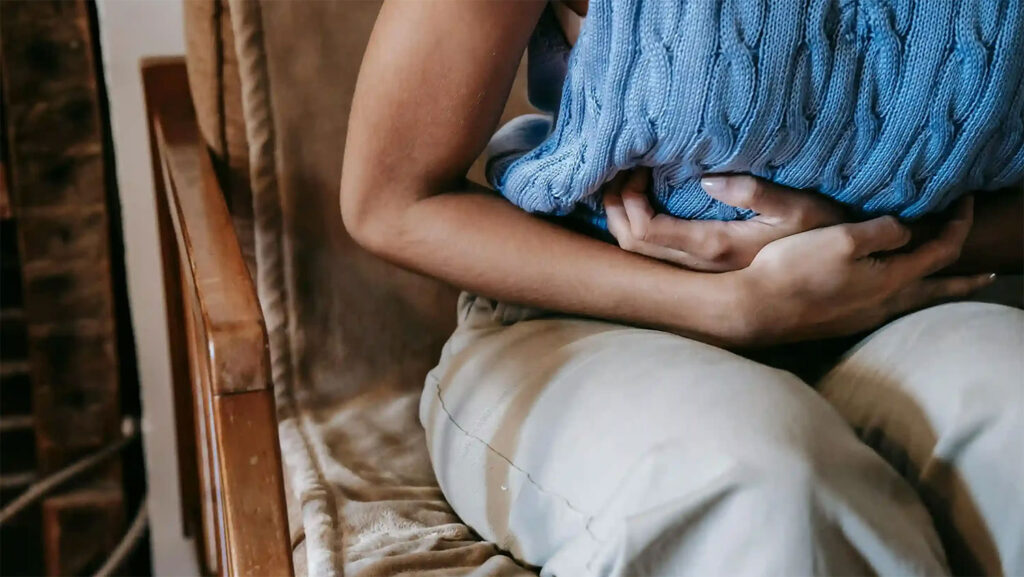
There are some other minor risks you might face when you visit Uluwatu and they include:
- The dreaded “Bali Belly” – this is a catch-all term for a wide-variety of potential stomach upsets. However, the most usual cause is “traveller’s diarrhea”. You can usually avoid this by only drinking bottled water. The tap water in Bali is NEVER fit for human consumption. It can contain heavy metals, bacteria, amoeba and other contaminants. So, stick to bottled water. And if you do get a stomach upset, the best treatment is rehydration therapy.
- Heat stroke and sunburn – it gets pretty hot here in the tropics. It’s best to use a hat in the sun, slather on the suncream and wear UV resistant sunglasses. And where possible, stay in the shade. You can be hospitalized if you get severe sunburn and/or heat stroke and that won’t be cheap.
- Sporting accidents – if you like to play sports then it’s important to follow any safety tips that you’re given. You can’t guarantee that you won’t pick up an injury, but you can reduce the odds.
- Swimming accidents – if there is a lifeguard around (and in Bali, there often isn’t) make sure to follow any instructions they give you. We’d also encourage you to learn what flag warnings mean and follow those too.
- Dengue fever and mosquito borne illnesses – you won’t get malaria in Bali without really working for it but dengue and other diseases are also carried by mosquitoes. Wearing long sleeves and trousers can help reduce the odds of these diseases particularly in the early morning and late afternoon/early evening. You should also use a DEET based mosquito repellent.
Do I Need To Take Out Health Or Travel Insurance For Uluwatu?
We don’t sell insurance, but yes, we would recommend taking out, at least, some basic travel insurance.
If you are ill or get injured, you will find that medical bills here in Bali can quickly run into astronomical amounts. Every year there are various Go Fund Me appeals for $100,000 or more for someone who got hurt here on the island.
We would note that if you want to drive a scooter here, you need to make sure that your policy covers scooter use AND that you meet all the requirements to be road legal in Bali. If not, the policy is invalid.
Travel insurance is usually pretty cheap and it saves you from worrying about problems if they arise.
Can You Visit Uluwatu Safely As A Solo Female Traveller?
Yes, Uluwatu is about as safe as you can ask for for a solo female traveller. There are no particular additional risks faced by women in Uluwatu that they wouldn’t face anywhere else on the planet.
In fact, Bali is a very popular destination for women travelling alone because it has an excellent reputation for being safe and hospitable.

FAQs
Is Uluwatu Safer Than Other Parts Of Bali?
Bali as a whole is generally a very safe place for visitors and while Uluwatu, according to local police, is probably a bit safer than average there’s not much in it.
The nightlife area of Kuta is probably the riskiest place to spend time here and even that is far safer than the nightlife areas of most major Western cities.
The fewer people around, the safer a place tends to be in Bali but most places are very safe.
Is It Safe To Walk Around Uluwatu?
You can walk around Uluwatu and yes, it’s generally safe. However, the roads and sidewalks are not suited to anyone with mobility issues.
It’s important to prepare for the heat while walking in this area, services and cafes, etc. tend to be very spaced out and in the Bali sun, a long walk can be extremely exhausting or even lead to sunstroke or heatstroke.
You should also keep an eye on the road surfaces and the traffic around you at all times. Both can lead to accidents.
Does Uluwatu Have High Levels Of Crime?
No, there’s very little crime in Bali beyond tourist scams and petty theft. Uluwatu is a very safe area and you’re not likely to end up in any trouble there as long as you keep your wits about you.
Is Uluwatu A Good Area In Bali?
Yes, Uluwatu is a very popular tourist town (particularly for the surfer crowd) and it has some of the island’s nicest beaches and resorts. We wouldn’t be opening Little Bingin in Uluwatu if we thought otherwise.
Final Thoughts On Is Uluwatu Safe?
Is Uluwatu safe? Yes, it is and as long as you use the tips above, your personal safety should be great while you’re in Uluwatu.
The biggest risks you face on holiday here tend to be Bali Belly (which you can really reduce the chances of catching by only using bottled water), petty crime and other travellers.
You are very unlikely to encounter any kind of natural disaster in Uluwatu and more serious crime is also very rare.
For most people, a stay in Uluwatu is probably safer than it is staying in their home town in the West.

